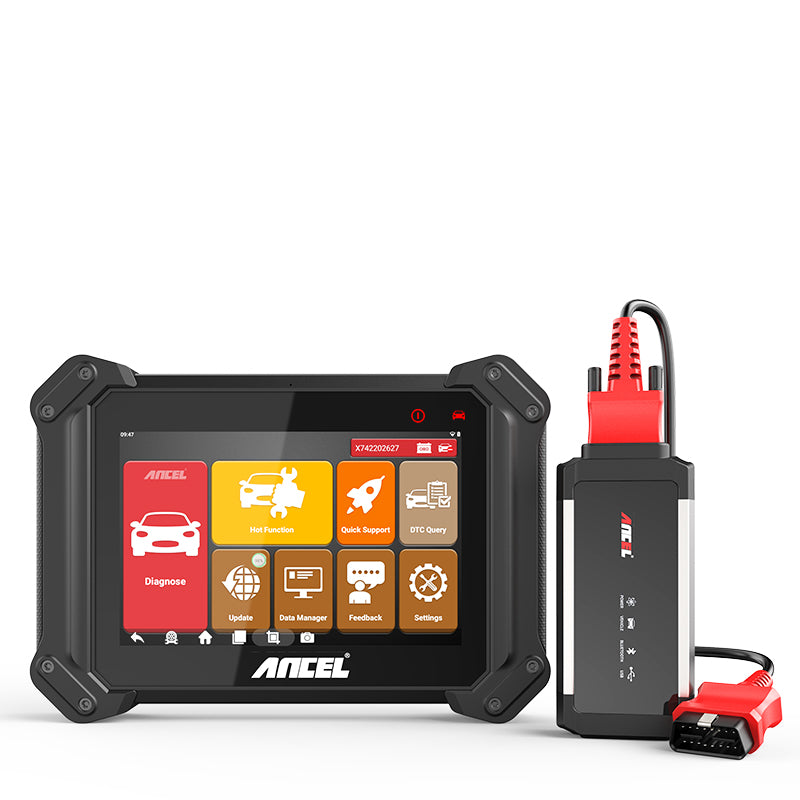Thinking about buying a used car?
Mileage is one of the most critical factors to consider.
The number of miles on the odometer can tell you a lot about a vehicle's history and potential future. But how many miles are too many?
When purchasing a used car, having a reliable tool to assess the vehicle's condition can make all the difference.
ANCEL's obd2 scanner is an excellent device that allows you to identify the car's functions and diagnose potential issues before making a purchase.
Mileage and Vehicle Age
Mileage and vehicle age go hand in hand.
A car that's only a few years old but has racked up high mileage might indicate extensive usage, possibly for long commutes or commercial purposes.
Conversely, an older car with low mileage might have been used sparingly, suggesting a different kind of wear and tear.
This balance between age and mileage is crucial when evaluating a used car. A three-year-old car with 80,000 miles might have primarily highway miles, which are generally less strenuous on the vehicle.
In contrast, a ten-year-old car with 30,000 miles might have undergone shorter, stop-and-go trips, causing more wear on the engine and transmission.
Related Reading: What's The Best Used Car Diagnostic Check?
Which is More Important: Mileage or Age
Mileage gives you an idea of how much the car has been driven, which directly impacts wear and tear on the vehicle's components.
Age affects the car in terms of age-related deterioration.
Rubber components, such as seals and hoses, can degrade over time regardless of mileage.
Additionally, a car that has been driven infrequently might have issues like rust, stale fluids, and other problems associated with prolonged periods of inactivity.
High Mileage Vehicles: Pros and Cons
These cars have already gone through the bulk of their depreciation, meaning their value will hold steadier.
However, higher mileage can mean more wear and tear, leading to potential repairs and maintenance costs.
When it comes time to sell, a high mileage car will fetch a lower price than a low mileage counterpart.
It's important to factor in the potential costs associated with high mileage cars. While the purchase price may be lower, you should budget for possible repairs.
Common issues in high mileage vehicles include suspension wear, transmission problems, and engine component fatigue.
A thorough inspection by a trusted mechanic can help identify these potential issues before purchase.
$439.99
What Mileage Is Too Much
Ultimately, "too much mileage" depends on the vehicle's make, model, maintenance history, and your personal tolerance for risk.
For economy cars, aim for under 100,000 miles. Luxury vehicles can handle higher mileage due to better engineering, so look for cars under 150,000 miles.
Trucks and SUVs are known for durability and can often go beyond 200,000 miles with proper care.
If you plan to use the car for daily commuting, a vehicle with lower mileage might be more practical.
For occasional use or as a secondary vehicle, a higher mileage car could be a cost-effective choice.
Additional Considerations
When purchasing a used car, consider the following additional factors.
Vehicle History Report: Obtain a comprehensive vehicle history report.
This report will provide information on past accidents, title issues, and service history.
It can also reveal if the car has been used as a rental or fleet vehicle, which may indicate higher wear and tear.
Test Drive: Always take the car for a test drive.
Pay attention to how it handles, any unusual noises, and the functionality of all systems.
A test drive can reveal issues that might not be apparent from a visual inspection alone.
Ownership Costs: Consider the total cost of ownership, including insurance, fuel efficiency, and expected maintenance costs.
High mileage vehicles may have higher maintenance costs, but if they are fuel-efficient and have lower insurance rates, they might still be a good investment.
Warranty: Check if the vehicle has any remaining manufacturer’s warranty or if you can purchase an extended warranty.
A warranty can provide peace of mind and protect you from unexpected repair costs.
Conclusion
When assessing a used car, mileage is an essential factor, but it should never be the sole consideration. A high-mileage car with a solid maintenance history can be a better investment than a low-mileage vehicle that's been neglected.
FAQs
Can a car with over 200,000 miles still be reliable?
Yes, if the car has been well-maintained and serviced regularly, it can still provide reliable transportation.
Is it better to buy an older car with low mileage or a newer car with high mileage?
It depends on the car's condition and maintenance history. Both can be good choices if they have been properly cared for.
How important are maintenance records when buying a used car?
Maintenance records are crucial as they provide insight into how well the car has been maintained, which can affect its longevity and performance.















